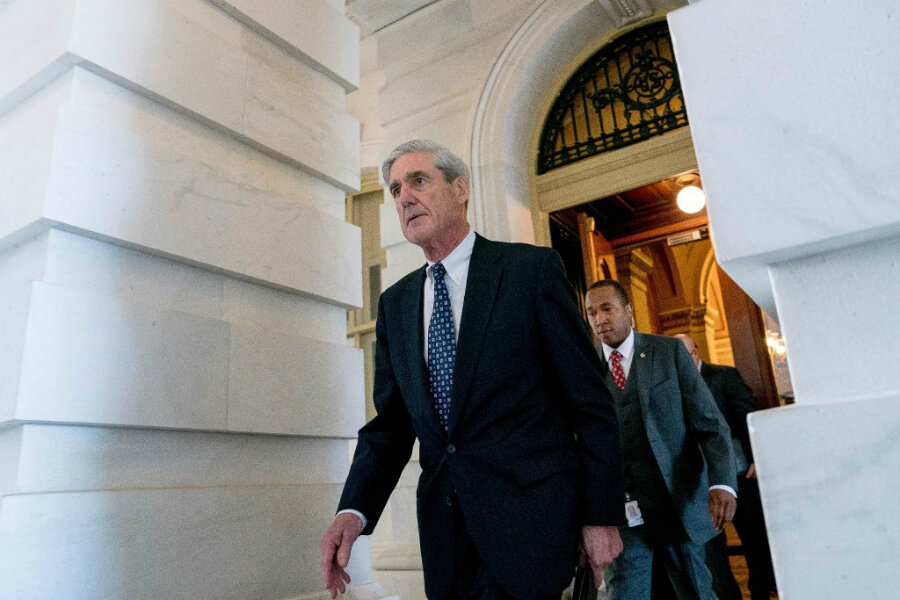Russia probe now involves grand jury
Loading...
| Washington
Special Counsel Robert Mueller is using a grand jury in Washington as part of an investigation into potential coordination between the Trump campaign and Russia, a person familiar with the probe says.
The use of a grand jury, a standard prosecution tool in criminal investigations, suggests that Mr. Mueller and his team of investigators are likely to hear from witnesses and demand documents in the coming weeks and months.
The person who confirmed to The Associated Press that Mueller had turned to a grand jury was not authorized to discuss the investigation by name and spoke on condition of anonymity.
The Wall Street Journal first reported the use of a grand jury.
Grand juries are common vehicles to subpoena witnesses and records and to present evidence, though they do not suggest any criminal charges are near or will necessarily be sought. It was not immediately clear how or whether the Washington grand jury was connected to the work of a separate one in Alexandria, Virginia. That panel has been used to gather information on Michael Flynn, President Trump's former national security adviser.
A spokesman for Mueller's team did not return an email seeking comment.
"We won. Move on!" Mr. Trump demanded in a tweet posted early Friday, a day after he leveled a host of broadsides against Democrats and investigators at a rally in Huntington, West Virginia.
Mueller's reliance on a grand jury is the "logical next step in this investigation" given that it's the traditional method for prosecutors to gather evidence, said Washington defense lawyer Jacob Frenkel.
"The use of the grand jury neither escalates, nor establishes a timeline for, the investigation," he added.
Trump, during an appearance Thursday evening at a rally in Huntington, W.Va., challenged Democrats to either continue their "obsession with a hoax" or begin serving the interests of the American people.
"I just hope the final determination is a truly honest one," he said, "which is what the millions of people who gave us our big win in November deserve and what all Americans who want a better future want and deserve."
Lawyers for Trump said earlier they were unaware of the existence of a grand jury and had no information to suggest the president himself was under federal investigation.
"With respect to the news of the federal grand jury, I have no reason to believe that the president is under investigation," defense attorney John Dowd told the AP.
Ty Cobb, special counsel to the president, said he wasn't aware Mueller had started using a new grand jury.
"Grand jury matters are typically secret," Mr. Cobb said. "The White House favors anything that accelerates the conclusion of his work fairly. ... The White House is committed to fully cooperating with Mr. Mueller."
It was not clear what witnesses might appear before the grand jury or what evidence it might be accumulating or presented with.
Though there is "considerable deference to the prosecutors and their recommendations" when it comes to a grand jury, "the mere fact of presenting evidence to the grand jury does not obligate prosecutors in any way to ask them to return an indictment," Mr. Frenkel said.
Mueller, who worked as a prosecutor in Washington before becoming FBI director, was appointed special counsel in May by the Justice Department following the firing by Trump of FBI Director James Comey. He has since assembled a team of more than a dozen investigators, including current and former Justice Department prosecutors with experience in international bribery, organized crime and financial fraud.
News of the grand jury came as senators introduced two bipartisan bills aimed at protecting Mueller from being fired by Trump, with both parties signaling resistance to any White House effort to derail the investigation into Russian meddling in last year's election.
Trump's defense team has been looking into potential conflicts of interest among members of Mueller's team, such as past political contributions to Democrats including Hillary Clinton, and Trump has warned that any effort by Mueller to look into his finances would fall outside the scope of Mueller's appointment.
Under the regulations, Deputy Attorney General Rod Rosenstein is the government official empowered to fire Mueller under limited circumstances, such as conflict of interest and dereliction of duty. Mr. Rosenstein, who appointed Mueller, has publicly said he has seen no basis for firing him.
Trump attorney Jay Sekulow told Fox News on Thursday that "the president is not thinking about firing Robert Mueller so the speculation that's out there is just incorrect."
He also downplayed the significance of the grand jury, calling it "a standard operating procedure when you've got a situation like this."







